
Dr. Jack Stern has appeared repeatedly on “Top Doctors” lists, and for good reason: His contributions to neurosurgery and spine health are legion.
After earning his M.D. and Ph.D. at Einstein and completing residencies at New York University School of Medicine and Columbia-Presbyterian Medical Center, he pioneered the use of interoperative neuromonitoring to enhance patient safety during neurosurgery.
Dr. Stern founded a private-practice neurosurgical group, Brain and Spine Surgeons of New York. He currently focuses on spinal tumors, degenerative disc disease, herniated discs, and spinal reconstruction, and his book, Ending Back Pain, has been an Amazon best-seller. A past president of Einstein’s alumni board of governors, he dedicated a study room at the College of Medicine’s library in honor of his mentor, Alfred Angrist, M.D., the first chair of pathology.
Dr. Stern is an associate clinical professor of neurosurgery at New York Medical College and has also taught at Yale University School of Medicine, Weill Cornell Medical College, and Tufts University School of Medicine. He has been a member of the American Jewish Committee and the board of trustees of the Gay Men’s Health Crisis.
Dr. Stern, why did you decide to go into medicine?
Dr. Stern: “I had no choice. I’m a third-generation doctor. My father was a physician who graduated from the University of Vienna. When the Holocaust came, he got to Shanghai, where I was born, then the United States. Very early my father was saying, ‘You’re going to become a doctor.’ And I’ve loved being a physician and a surgeon.”
What factors influenced you to apply to Einstein?
“Einstein was a very exciting place. One of my father’s friends knew Dr. Angrist, the world-renowned pathologist, and he was like my uncle. He said, ‘You’re coming to Einstein and we’ll figure it out.’ There was also the school’s Jewish orientation, and I wanted to stay in New York. So it all fit.”
How did your experience at Einstein influence your career?
“The excellent education I received at Einstein provided me with limitless opportunities. At the time, NYU was the number one surgical program in the country and Columbia was the number one neurosurgery program, and I was accepted to both. Later I was hired by Einstein graduates who were neurosurgery residents when I was a student, and they had opened a practice in Westchester.”
What mentors at Einstein helped you in your career?
“As an undergraduate I met Nobel laureates who were great mentors and took the time to teach. Another mentor was Murray Bornstein. I did a lot of my work in his lab. He gave me a cabin on his property so that I wouldn’t be interrupted while writing my thesis. Dr. Angrist was another mentor. At Einstein, everybody knew each other, and it just felt like home. Having been the son of Holocaust survivors who were displaced, this was a deep and meaningful thing. When I was head of the board, I started a program that matched students with mentors."
What is the professional accomplishment you’re most proud of?
“Building what at the time was the largest neurosurgical group in the country. Our group covered the entire Hudson Valley from Poughkeepsie down to New Rochelle, and we provided great care. I did general neurosurgery for years and later started a spine group in Westchester. At our height, we were 12 surgeons—an enormous practice. That’s how I came to write Ending Back Pain, which was published by Penguin Press. People still buy the book.”
What advice would you give our current and future students at Einstein?
“Get a mentor. Unfortunately, physicians today are under a lot of pressure, and mentoring may not be among their top priorities. But some do value mentoring. The students know who the teachers who care are and who will devote their time even after hours.”
Why do you choose to give back to Einstein?
“Because I owe it. Einstein gave me a chance to become a physician. I give yearly to the Annual Fund, and I’m leaving money in my will to the medical school. How can one not feel an obligation to give back? It’s as simple as that.”
2024 Alumni Awardees